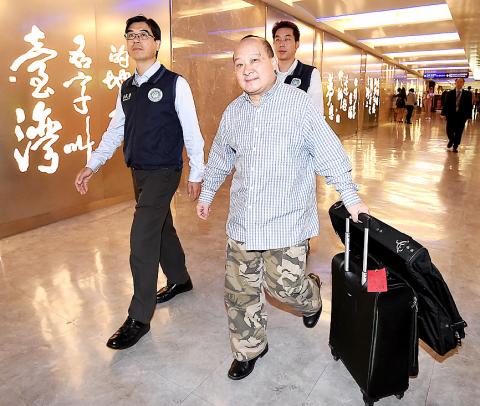Visiting Chinese academic Li Yi (李毅) was deported from Taiwan yesterday morning because he was scheduled to make a public speech, which would have breached the terms of his entry permit, the National Immigration Agency (NIA) said.
Li was found at a hostel in Nantou County at 12:35am and was deported on China Airlines Flight 601 from Taiwan Taoyuan International Airport to Hong Kong at 7:25am, the NIA said.
Entering Taiwan under the guise of sightseeing to advocate unifying Taiwan with China by means of force is “worse than terrorism,” Premier Su Tseng-chang (蘇貞昌) told reporters.

Photo: Chu Pei-hsiung, Taipei Times
“Taiwan is a free, democratic and open country. We welcome all to visit Taiwan... However, if you come here to advocate unification through armed invasion under the pretext of sightseeing, you are no different from a terrorist,” Su said.
Li’s deportation was proportionate; he had it coming, Su said, adding that there was no comparison to the treatment of Taiwanese human rights advocate Lee Ming-che (李明哲), who was sentenced to five years in a prison in China’s Hunan Province.
Minister of the Interior Hsu Kuo-yung (徐國勇) said Li should not have planned activities of a political nature or advocated the destruction of Taiwan’s sovereignty.
There are limitations to freedom of speech, Hsu said, adding that statements advocating unification with China by means of force are not welcome in Taiwan.
Li in August last year applied for a multiple-entry permit to visit Taiwan for tourism purposes and arrived in Taiwan on Tuesday, NIA Director-General Chiu Feng-kuang (邱豐光) said yesterday.
Li was asked to leave the country because of his intentions to engage in an activity inconsistent with the purpose of his entry permit, Chiu said.
Shortly before his departure yesterday, Li posted a “departure message” on Chinese social media platform WeChat, saying that the two sides of the Taiwan Strait will “eventually be unified.”
After landing in Hong Kong, he said in a radio interview that freedom of speech in Taiwan allows him to discuss topics such as “reunification,” whether by peaceful means or by force.
Li, who has advocated the use of force to unify Taiwan and China, was invited by the Chinese Unity Promotion Party (CUPP) to speak at a forum titled “Cross-Strait Peaceful Unification and Development,” in Taichung today.
In the speech, he was expected to address China’s proposal to implement a “one country, two systems” framework in Taiwan, the CUPP said on Facebook on Thursday.
Given his intentions to engage in activity of a political nature while on a tourist permit, and considering that his pro-unification speech might have jeopardized national security and social stability, Li would be asked to leave Taiwan, the NIA said on Thursday, citing the Regulations Governing the Approval of People of the Mainland Area Visiting Taiwan for Purposes of Tourism (大陸地區人民來台從事觀光活動許可辦法).
Li has been declared persona non grata and would be subject to restrictions if he returns to Taiwan, the Ministry of the Interior said.
Taichung City Councilor Huang Shou-ta (黃守達) of the Democratic Progressive Party said that Li has said that once the Chinese People’s Liberation Army crosses the Taiwan Strait, Taiwanese can forget about independence.
Additional reporting by Sean Lin

US climber Alex Honnold is to attempt to scale Taipei 101 without a rope and harness in a live Netflix special on Jan. 24, the streaming platform announced on Wednesday. Accounting for the time difference, the two-hour broadcast of Honnold’s climb, called Skyscraper Live, is to air on Jan. 23 in the US, Netflix said in a statement. Honnold, 40, was the first person ever to free solo climb the 900m El Capitan rock formation in Yosemite National Park — a feat that was recorded and later made into the 2018 documentary film Free Solo. Netflix previewed Skyscraper Live in October, after videos

NUMBERS IMBALANCE: More than 4 million Taiwanese have visited China this year, while only about half a million Chinese have visited here Beijing has yet to respond to Taiwan’s requests for negotiation over matters related to the recovery of cross-strait tourism, the Tourism Administration said yesterday. Taiwan’s tourism authority issued the statement after Chinese-language daily the China Times reported yesterday that the government’s policy of banning group tours to China does not stop Taiwanese from visiting the country. As of October, more than 4.2 million had traveled to China this year, exceeding last year. Beijing estimated the number of Taiwanese tourists in China could reach 4.5 million this year. By contrast, only 500,000 Chinese tourists are expected in Taiwan, the report said. The report

Temperatures are forecast to drop steadily as a continental cold air mass moves across Taiwan, with some areas also likely to see heavy rainfall, the Central Weather Administration (CWA) said. From today through early tomorrow, a cold air mass would keep temperatures low across central and northern Taiwan, and the eastern half of Taiwan proper, with isolated brief showers forecast along Keelung’s north coast, Taipei and New Taipei City’s mountainous areas and eastern Taiwan, it said. Lows of 11°C to 15°C are forecast in central and northern Taiwan, Yilan County, and the outlying Kinmen and Lienchiang (Matsu) counties, and 14°C to 17°C

STEERING FAILURE: The first boat of its class is experiencing teething issues as it readies for acceptance by the navy, according to a recent story about rudder failure The Hai Kun (海鯤), the nation’s first locally built submarine, allegedly suffered a total failure of stern hydraulic systems during the second round of sea acceptance trials on June 26, and sailors were forced to manually operate the X-rudder to turn the submarine and return to port, news Web site Mirror Daily reported yesterday. The report said that tugboats following the Hai Kun assisted the submarine in avoiding collisions with other ships due to the X-rudder malfunctioning. At the time of the report, the submarine had completed its trials and was scheduled to begin diving and surfacing tests in shallow areas. The X-rudder,